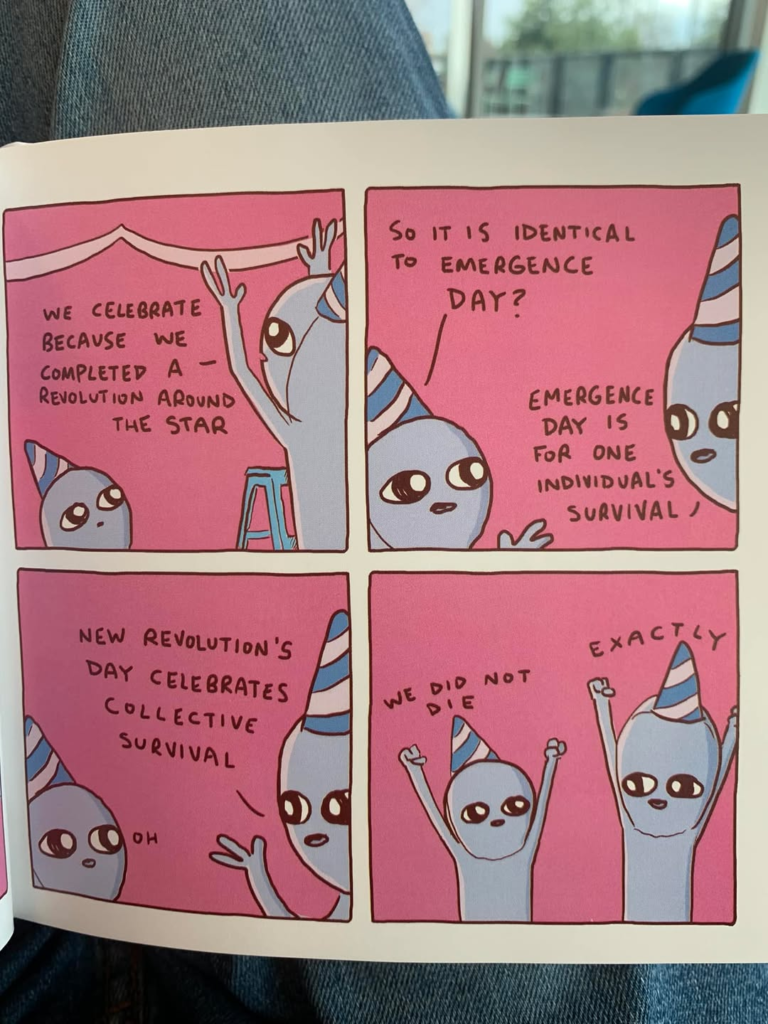Stranger Planet by Nathan Pyle

Books Bragging Building in Public Cycling Food for thought Games Interviews Journal Lucid Dreaming Mental Health Movies Open Goals Poetry Productivity Quotes Ranting Smart Keys Sustainability Travel Youper

Friday Morning Hope:
See more products that put us back in touch with ourselves, each other, and the world around us. Thanks Humane team, for being persistent and rethinking Human-Computer Interaction.
Friday Evening Pessimism:
I don’t think their first product (ai pin*) will take off. 🙁
*In Brazil, Aipim means Cassava Root. I used to plant on my front yard, I miss that.
Just finished reading “The Founder’s Dilemmas” by Noam Wasserman and wow, it’s a rollercoaster of insights! 💡🎢
1️⃣ First up, the book dives into the murky waters of hiring. Ever thought your COO was redundant? Well, this book suggests that sometimes, having a COO in a early stage startup is a big red flag – or is your COO the real CEO? Tough pill to swallow for some! 💊
2️⃣ Next, it hits where it hurts: dealing with underperformers. The dilemma? Keeping them might preserve team morale and knowledge, but at what cost to your startup’s growth and efficiency? It’s a high-stakes game of balancing growth with loyalty. 🤔⚖️
3️⃣ And the most controversial of all: founding with friends. Sounds like a dream, right? Not so fast! The book suggests you’re likely to lose either your company, your friends, or both. Friendship and business, a volatile mix?
There are a bunch of other hot takes. Here are all my highlights.
Join me in my dream,
leaving the body
and entering the stream.
I’m floating on the waves
in the center of the universe.
One with the rhythm,
one with the stream.
Reflecting on the thought-provoking work1 of Sharra Vostral, it’s intriguing to explore how her concept of “BIOLOGICALLY INCOMPATIBLE TECHNOLOGY” can be applied in the current digital age.
In the ’80s, an innovative product was launched amid much fanfare – a smaller, lighter, and super absorbent tampon.

Unfortunately, this new product led to an outbreak of Toxic Shock Syndrome (TSS), especially among young women. The company said that the product itself was harmful, but in a complex interplay of variables, it enabled Staphylococcus aureus to reproduce rapidly, producing a deadly toxin. This concept has since been recast as “biocatalyst technologies” in her latest book, “Toxic Shock,” which has truly captured my attention.
Ultimately, that particular tampon was removed from the market, but its users were blamed for using it “incorrectly,” a notion that persists and contributes to the stigma surrounding TSS today. The prevailing sentiment seems to be that if someone suffers from TSS, it’s her fault.
Fast forward to the present day, we are surrounded by new digital projects, many of which have unanticipated outcomes. Social media has often been implicated in a rise in depression and anxiety², and thousands of novel digital solutions are emerging. Particularly alarming is the sharp increase in suicides among young women², which brings to mind the young women affected by TSS decades ago.
These parallels lead me to ask:
– Are we, as product innovators and leaders, unintentionally developing what could be deemed “psychologically incompatible technology?”
– Are we fostering an era of anxiety and depression-catalyst technologies? Like a Digital Toxic Shock?
– Will we blame the users (again) if something unexpected happens?
We must remember to keep human well-being at the heart of technological advancement.
For a deeper dive, here are the articles that helped me connect these ideas:
1. Rely and Toxic Shock Syndrome: A Technological Health Crisis
2. Jonathan Haidt and Zach Rausch‘s research on the teen mental health crisis
3. Almost a Third of High-School Girls Considered Suicide in 2021